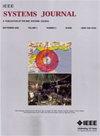Failure Propagation Graphs for Studying Cascading Failure Propagation in Power Networks
IF 4.4
3区 计算机科学
Q1 COMPUTER SCIENCE, INFORMATION SYSTEMS
引用次数: 0
Abstract
Cascading failure, characterized by the widespread propagation of failure events, is a common cause for severe blackouts in power networks. Strengthening critical branches in a power network is crucial for mitigating the risk of blackouts resulting from cascading failures. In this article, we propose a time-efficient greedy search method to identify critical branches in a power network. We address the challenge of computational constraints by using a failure propagation graph, which accurately captures the critical failure propagation patterns based on cascading failure simulation. Our approach minimizes cascading failure risk while strategically reinforcing a limited number of branches. The failure-propagation-graph greedy-search (FPG-GS) algorithm selects candidate branches based on cascading failure simulation and iteratively identifies the most crucial branches. Our experimental results on different power systems demonstrate the superior performance and efficiency of the FPG-GS algorithm compared to existing methods. In addition, our study highlights the importance of strategic branch selection, showing that reinforcing one-fifth of the branches can achieve a mitigation rate exceeding 80%.研究电网级联故障传播的故障传播图
级联故障是电网严重停电的常见原因,其特征是故障事件的广泛传播。加强电网中的关键支路对于减轻由级联故障引起的停电风险至关重要。本文提出了一种省时的贪婪搜索方法来识别电网中的关键支路。我们通过使用故障传播图来解决计算约束的挑战,该图准确地捕获了基于级联故障模拟的关键故障传播模式。我们的方法最小化了级联故障风险,同时战略性地加强了有限数量的分支。故障传播图贪婪搜索(fpga - gs)算法基于级联故障仿真选择候选分支,迭代识别最关键的分支。我们在不同电力系统上的实验结果表明,与现有方法相比,fpga - gs算法具有优越的性能和效率。此外,我们的研究强调了战略分支选择的重要性,表明加固五分之一的分支可以实现超过80%的缓解率。
本文章由计算机程序翻译,如有差异,请以英文原文为准。
求助全文
约1分钟内获得全文
求助全文
来源期刊

IEEE Systems Journal
工程技术-电信学
CiteScore
9.80
自引率
6.80%
发文量
572
审稿时长
4.9 months
期刊介绍:
This publication provides a systems-level, focused forum for application-oriented manuscripts that address complex systems and system-of-systems of national and global significance. It intends to encourage and facilitate cooperation and interaction among IEEE Societies with systems-level and systems engineering interest, and to attract non-IEEE contributors and readers from around the globe. Our IEEE Systems Council job is to address issues in new ways that are not solvable in the domains of the existing IEEE or other societies or global organizations. These problems do not fit within traditional hierarchical boundaries. For example, disaster response such as that triggered by Hurricane Katrina, tsunamis, or current volcanic eruptions is not solvable by pure engineering solutions. We need to think about changing and enlarging the paradigm to include systems issues.
 求助内容:
求助内容: 应助结果提醒方式:
应助结果提醒方式:


